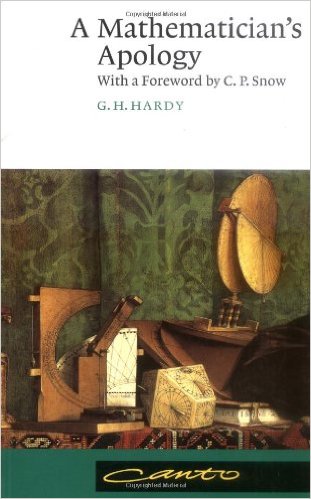I just finished reading “A Mathematician’s Apology,” written by the number theorist G. H. Hardy in 1940. I sort of assumed I had already read it when I was younger, but this turns out to be completely false.
How do I know that I’ve never read it? Before opening it this time, I thought it was a book focusing on his relationship with the prodigy Ramanujan. (Was Hardy the one who gave him tuberculosis?) Nope, Ramanujan is barely mentioned at all.
Instead, the book is Hardy’s defense of mathematics. In brief, he laments that the kind of advanced mathematics he studied was not useful; and in the book he defends his life choice to spend all his professional time studying it.
Another major theme is that Hardy was past what he considered to be the mathematical prime of his life: he was age 62, although he would go on to live for another 7 years. He famously wrote,
No mathematician should ever allow himself to forget that mathematics, more than any other art or science, is a young man’s game.
This, of course, is questionable, despite the examples Hardy gives in the book. Consider, for instance, László Babai’s apparent discovery this year of a quasi-polynomial-time algorithm for Graph Isomorphism, at the distinguished age of 65.
Beyond simply talking about perspectives on age, the book is very wistful and has a somewhat depressed perspective. I’ll admit people in inter-war Europe had reason to be troubled; the armed forces seemed to be so much more important than peaceful intellectual pursuits. It is too bad, though, that Hardy did not have the benefit of hindsight.
He wrote,
The general conclusion, surely, stands out plainly enough. If useful knowledge is, as we agreed provisionally to say, knowledge which is likely, now or in the comparatively near future, to contribute to the material comfort of mankind, so that mere intellectual satisfaction is irrelevant, then the great bulk of higher mathematics is useless. Modern geometry and algebra, the theory of numbers, the theory of aggregates and functions, relativity, quantum mechanics — no one of them stands the test much better than another, and there is no real mathematician whose life can be justified on this ground. If this be the test, then Abel, Riemann, and Poincare wasted their lives; their contribution to human comfort was negligible, and the world would have been as happy a place without them.
This is pretty far from how things have turned out. Quantum mechanics and relativity have made possible things like transistors and GPS satellites. The theory of numbers and algebra led way to encryption which has had far-reaching effects on our daily life. Hardy actually admitted as much just a few pages earlier:
Time may change all this. No one foresaw the applications of matrices and groups and other purely mathematical theories to modern physics, and it may be that some of the ‘highbrow’ applied mathematics will become ‘useful’ in as unexpected a way; but the evidence so far points to the conclusion that, in one subject as in the other, it is what is commonplace and dull that counts for practical life.
So I don’t know if his conclusions of “everything is useless” is from a British sense of self-deprecation, or just griping from his yearning for youth.
I found the contrast even starker here:
Real mathematics has no effects on war. No one has yet discovered any warlike purpose to be served by the theory of numbers or relativity, and it seems very unlikely that anyone will do so for many years.
In a delicious twist of fate, Hardy’s job at Oxford put him just about 50 kilometers from Bletchley Park, where his compatriots such as Alan Turing and Bill Tutte were using combinatorics to reveal the secrets of the Nazis in World War 2. Admittedly, what they did was even beneath the “theory of numbers;” they used group theory, heuristics, and improvements to brute-force methods along with computer engineering. Even so, Hardy specifically disparaged pursuits of this ilk, calling out newspaper puzzles and chess problems as just having a mathematical “kick.”
All said, I still liked the book. Hardy talks at length about the aesthetics of mathematics and these discussions really struck a chord with me: once you’ve proven a mathematical statement, it stands true forever.
Now, I need to go (re-)learn about Gaussian integers in order to understand Hardy’s comments about the 2-squares theorem!

That’s my book you stole away from me! Time to give it back :{)